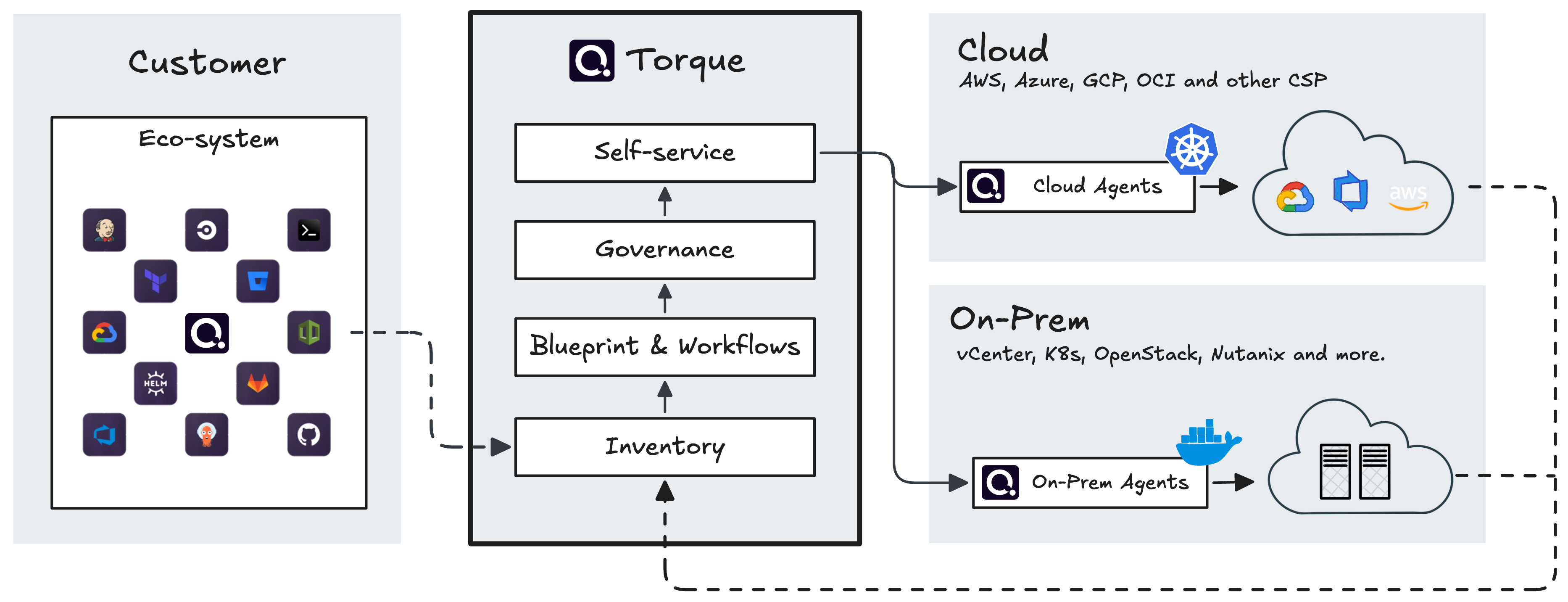Architecture

Torque is a comprehensive environment-as-a-service platform designed to bridge the gap between infrastructure complexity and user accessibility. The platform operates across three core domains that work together to deliver governed, self-service infrastructure and application deployment capabilities.
Core Domains
1. Curate
The curation domain focuses on connecting to existing automation and Infrastructure as Code (IaC), establishing cloud connectivity, and ingesting resources into a comprehensive inventory to create reusable building blocks.
Key Capabilities:
- Asset Repository Integration: Connect to existing source control repositories containing Terraform modules, AWS CloudFormation templates, Helm charts, Kubernetes manifests, Shell scripts, and Ansible playbooks
- Cloud Provider Connectivity: Seamless integration with Amazon Web Services (AWS), Microsoft Azure, Google Cloud Platform (GCP), Oracle Cloud Infrastructure (OCI), VMware vCenter/vSphere, and Kubernetes clusters
- Resource Inventory: Comprehensive discovery and cataloging of existing cloud and on-premises resources
- Blueprint Creation: Transform individual assets into reusable blueprints for standardized deployments across all environments
2. Operate
The operation domain leverages Quali agents deployed on customer premises (or Quali-managed) to handle resource provisioning, environment state management, and lifecycle orchestration with governed access controls.
Key Capabilities:
- Torque Execution Agents: Lightweight, container-based instances deployed on Kubernetes clusters or Docker hosts that communicate with Torque backend to execute deployment tasks
- Agent Deployment Options: Amazon EKS, Azure Kubernetes Service, Google GKE, Oracle OKE, self-managed Kubernetes, and Docker hosts (on-premises)
- Built-in Quali Agent: Pre-configured execution agent for Terraform and AWS CloudFormation deployments without requiring custom agent deployment
- Environment Lifecycle Management: Complete state management from provisioning through decommissioning
- Day-2 Operations: Ongoing environment management including updates, drift detection, and maintenance workflows
- Governed Access: Role-based access controls and policy enforcement throughout the operational lifecycle
3. Self-Service
The self-service domain provides a governed catalog with policy-driven access controls, enabling users to deploy cloud and on-premises infrastructure with one-click simplicity.
Key Capabilities:
- Governed Catalog: Rich environment catalog with built-in governance through policies, approval flows, and strong RBAC
- One-Click Deployment: Simplified deployment of complex infrastructure and services including:
- Cloud and on-premises infrastructure
- Container deployments and orchestration
- Application lifecycle management
- Policy Engine: Comprehensive governance framework ensuring compliance and cost control
- Approval Workflows: Customizable approval processes integrated with IT Service Management platforms
- Developer Ecosystem Integration: Native integration with CI/CD tools, developer environments, and DevOps workflows
Multi-Environment Support
Torque supports comprehensive deployment across all infrastructure types:
- Public Cloud: AWS, Azure, GCP, Oracle Cloud
- Private Cloud: VMware vCenter/vSphere, OpenStack
- Hybrid Cloud: Mixed cloud and on-premises deployments
- Container Platforms: Kubernetes, Docker, container orchestration platforms
- On-Premises: Physical infrastructure, virtualized environments
Deployment Models
Torque is available in three flexible deployment models to meet diverse organizational requirements:
1. Multi-Tenant SaaS
- Shared Infrastructure: Cost-effective solution with shared Torque backend services
- Rapid Deployment: Fastest time-to-value with minimal setup requirements
- Managed Operations: Fully managed by Quali with automatic updates and maintenance
- Scalable: Shared resource pooling for optimal cost efficiency
2. Single-Tenant SaaS
- Dedicated Infrastructure: Isolated Torque backend services for enhanced security and performance
- Customization: Greater configuration flexibility and customization options
- Compliance: Enhanced compliance capabilities for regulated industries
- Managed Operations: Fully managed by Quali with dedicated support
3. Private Instance (On-Premises)
- Complete Control: Full control over infrastructure, data, and operations
- Air-Gapped Support: Deployment in disconnected or highly secure environments
- Custom Integration: Deep integration with existing enterprise systems and workflows
- Self-Managed: Customer-controlled deployment, maintenance, and operations
Integration Ecosystem
Notification Engines
Automated notifications for environment lifecycle events through:
- Email notifications
- Microsoft Teams integration
- Slack integration
- Custom webhooks for third-party systems
Developer Tools
- CI/CD Integration: Azure DevOps, CircleCI, Jenkins, GitHub Actions, Spinnaker, TeamCity, Bamboo CI
- Development Interface: VSCode Extension, Torque CLI, comprehensive REST API
ITSM Integration
Enterprise-grade integration with IT Service Management platforms:
- ServiceNow integration for approval workflows
- BCM Remedy support (coming soon)
- Custom ITSM integration capabilities